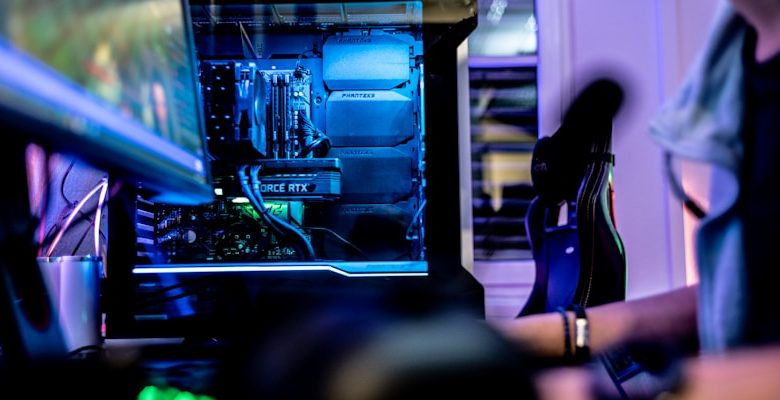How Blockchain Is Driving Innovation in the Gaming Industry

- The rise of blockchain technology in the gaming sector
- Exploring the impact of blockchain on in-game economies
- Enhancing security and transparency through blockchain in gaming
- Innovative use cases of blockchain in game development
- Challenges and opportunities for blockchain adoption in gaming
- The future of gaming with blockchain technology
The rise of blockchain technology in the gaming sector
Blockchain technology is revolutionizing the gaming industry by introducing new ways to enhance player experiences and increase transparency. One of the key advantages of blockchain in gaming is its ability to create unique, verifiable digital assets that players can truly own. This ownership opens up a world of possibilities, from trading in-game items across different platforms to creating rare collectibles with real-world value.
Another significant impact of blockchain in gaming is the ability to create decentralized marketplaces where players can securely buy, sell, and trade assets without the need for intermediaries. This not only empowers players but also reduces fraud and ensures fair transactions. Additionally, blockchain technology can be used to create provably fair games, where the odds and outcomes are transparent and cannot be manipulated.
Furthermore, blockchain allows for the creation of unique gaming experiences through the use of non-fungible tokens (NFTs). These tokens represent one-of-a-kind assets within games, such as rare characters, skins, or weapons. By leveraging blockchain technology, game developers can offer players exclusive content and rewards that are truly unique and cannot be replicated.
Exploring the impact of blockchain on in-game economies
Exploring the impact of blockchain on in-game economies reveals a new era of possibilities for gamers and developers alike. Blockchain technology has the potential to revolutionize the way in-game assets are bought, sold, and traded, creating a more secure and transparent ecosystem for virtual economies.
One of the key benefits of blockchain in gaming is the ability to verify the authenticity and ownership of in-game items. By using blockchain technology, players can have full control over their virtual assets, ensuring that they are not counterfeit or duplicated. This increased level of security can help to combat fraud and protect the value of in-game items.
Furthermore, blockchain can enable true ownership of in-game assets, allowing players to transfer or sell their items outside of the game environment. This opens up new opportunities for players to monetize their gaming experience and create a real-world value for their virtual possessions.
Another significant impact of blockchain on in-game economies is the potential for decentralized marketplaces. With blockchain technology, developers can create peer-to-peer trading platforms that allow players to buy and sell assets directly with one another, without the need for intermediaries. This can reduce transaction fees and increase the liquidity of in-game economies.
In conclusion, blockchain technology has the power to transform in-game economies by providing increased security, ownership rights, and decentralized marketplaces. As more game developers adopt blockchain solutions, we can expect to see a new era of innovation and economic growth in the gaming industry.
Enhancing security and transparency through blockchain in gaming
Blockchain technology has revolutionized the gaming industry by enhancing security and transparency. By utilizing blockchain, game developers can create secure, tamper-proof systems that prevent cheating and hacking.
One of the key benefits of blockchain in gaming is the ability to verify the authenticity of in-game assets. This means that players can be confident that the items they purchase or earn in-game are unique and cannot be duplicated.
Moreover, blockchain technology allows for transparent and decentralized systems, reducing the risk of fraud and manipulation. This fosters trust among players and ensures a fair gaming experience for all.
Overall, the integration of blockchain in gaming not only enhances security and transparency but also opens up new possibilities for innovative game mechanics and monetization strategies.
Innovative use cases of blockchain in game development
Blockchain technology has opened up new possibilities for game development, offering innovative use cases that can revolutionize the gaming industry. One of the key applications of blockchain in game development is the creation of unique digital assets. These assets, known as non-fungible tokens (NFTs), are stored on the blockchain and can represent in-game items, characters, or even entire game worlds. By using NFTs, developers can provide players with true ownership of their digital possessions, enabling them to buy, sell, and trade them both within and outside of the game.
Another exciting use case for blockchain in gaming is the implementation of decentralized autonomous organizations (DAOs). DAOs are community-run organizations that operate based on smart contracts, which are self-executing agreements stored on the blockchain. In the context of gaming, DAOs can empower players to participate in the decision-making process regarding the development of a game, such as voting on new features or changes to the game environment. This level of community engagement can foster a more collaborative and transparent relationship between developers and players.
Furthermore, blockchain technology can improve the security and integrity of online gaming experiences. By using blockchain-based solutions for player identity verification and transactions, developers can mitigate issues such as fraud, cheating, and data breaches. Additionally, the use of blockchain can enable transparent and tamper-proof record-keeping, ensuring that in-game achievements and rewards are accurately recorded and cannot be altered retroactively.
Overall, the innovative use cases of blockchain in game development are reshaping the gaming industry by introducing new levels of ownership, community engagement, and security. As developers continue to explore the potential of blockchain technology, we can expect to see even more groundbreaking applications that enhance the gaming experience for players around the world.
Challenges and opportunities for blockchain adoption in gaming
As blockchain technology continues to make waves in various industries, the gaming sector is also exploring the potential benefits it can offer. However, the adoption of blockchain in gaming comes with its own set of challenges and opportunities.
- Challenges:
- 1. **Scalability:** One of the main challenges for blockchain adoption in gaming is scalability. The current blockchain infrastructure may not be able to handle the high transaction volumes required by popular games.
- 2. **Cost:** Implementing blockchain technology can be costly, especially for smaller gaming companies. The initial investment and ongoing maintenance costs can be prohibitive.
- 3. **Regulations:** The gaming industry is heavily regulated, and integrating blockchain technology may pose legal challenges in terms of data privacy and security.
- Opportunities:
- 1. **Ownership:** Blockchain technology allows for true ownership of in-game assets, giving players more control over their virtual possessions.
- 2. **Transparency:** The transparent nature of blockchain can help increase trust between players and game developers, fostering a more open gaming ecosystem.
- 3. **Monetization:** With blockchain, players can earn real value for their in-game achievements, creating new monetization opportunities for both players and developers.
The future of gaming with blockchain technology
The future of gaming with blockchain technology is promising, with many industry experts touting it as the next big thing in gaming innovation. Blockchain technology offers a decentralized and secure way to store in-game assets, allowing players to truly own and trade their virtual items. This creates a new level of transparency and trust in the gaming ecosystem, as players can verify the rarity and authenticity of their items on the blockchain.
Furthermore, blockchain technology enables new gameplay mechanics, such as provably fair games and play-to-earn models. Provably fair games use blockchain to ensure that game outcomes are random and tamper-proof, providing players with a fair gaming experience. Play-to-earn models allow players to earn cryptocurrency by participating in games, creating new opportunities for gamers to monetize their skills and time.
In addition to these innovations, blockchain technology can also address issues of fraud and cheating in online gaming. By recording player interactions on the blockchain, developers can detect and prevent cheating more effectively. This enhances the overall gaming experience for players and fosters a more competitive and fair environment.
Overall, the integration of blockchain technology in gaming holds great promise for the future. As more developers and players embrace this technology, we can expect to see a new era of innovation and creativity in the gaming industry. The possibilities are endless, and the future of gaming with blockchain technology is bright.



